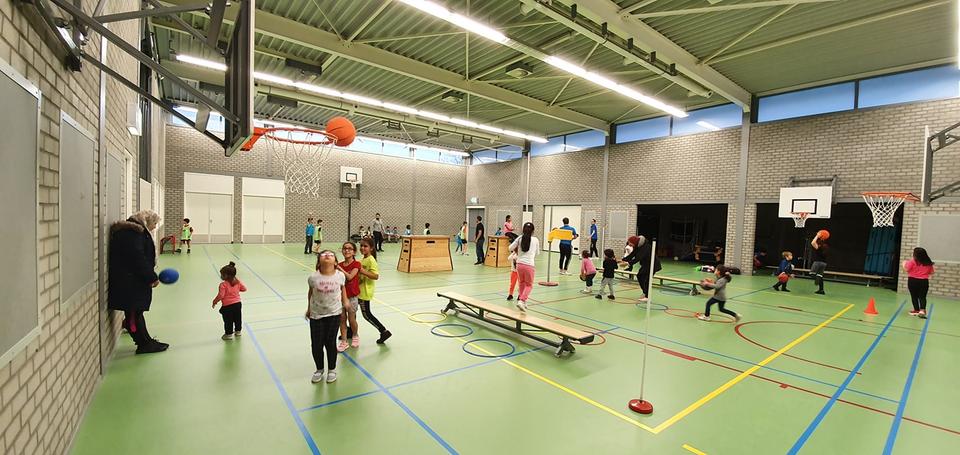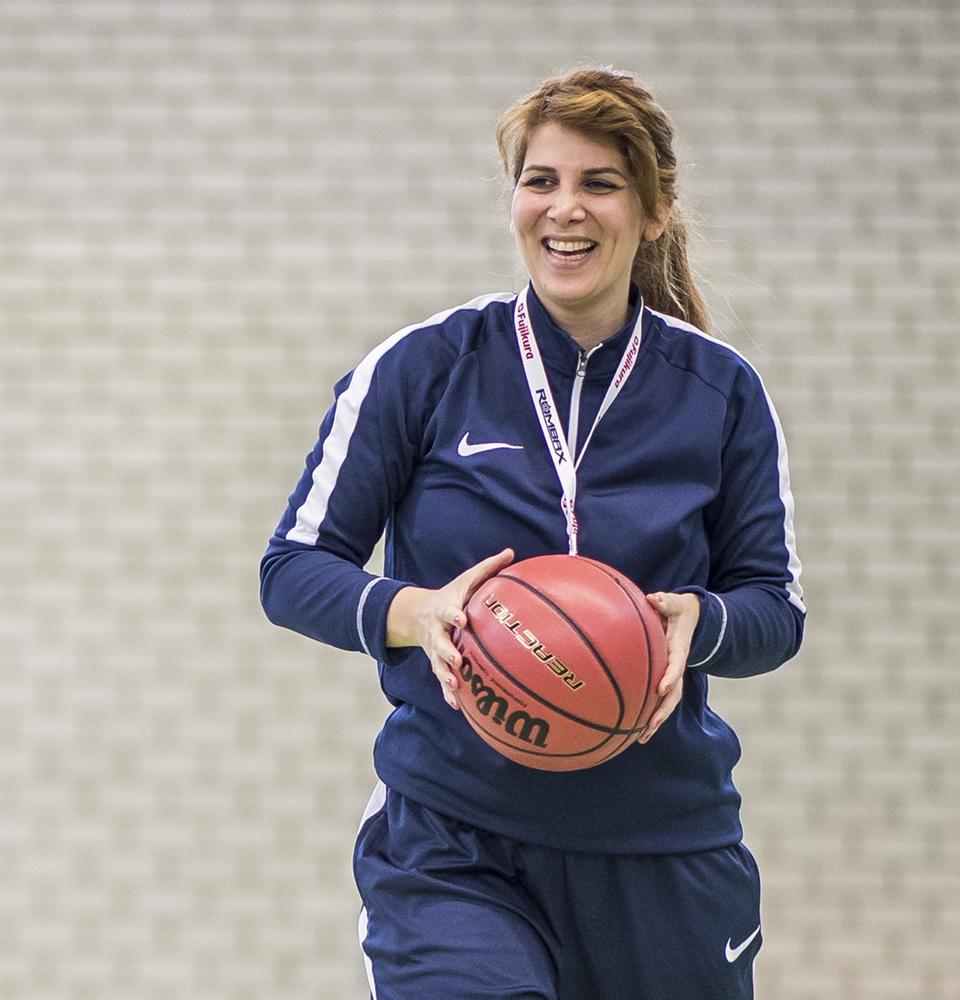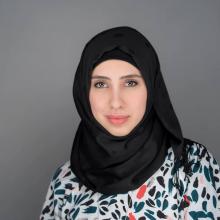Mother of two honoured with ‘Distinguished Woman’ title by her adopted home for her work in helping the community through sports.
In 2015, when Nadya Abu Salman fled her home in the Jaramana region of war-ravaged Syria, all she wanted for her two daughters was a life without the constant threat of death and devastation hanging over their heads.
Seven years later, her adopted home in the Netherlands—the small town of Venlo—honoured her as a ‘Distinguished Woman’, a title that comes with the ‘Women in the Media Award’ (Vrouwen in de Media).
Coming from a family of athletes, Nadya coaches youngsters in Venlo.
"It was a great surprise for me, and an honour to receive the title, which indicates the extent of respect and appreciation for people in all transparency, without considering where you are from and who you are,” she says. “But they focus on what you have and what you can offer to society in a way that affects the lives of others,” she adds.
The title of Distinguished Woman is honorary, announced every year in the Venlo region, and the winner is officially honoured on March 8, coinciding with International Women’s Day. One of the criteria that define the “distinguished women” is that they are involved with residents of Venlo, committed to improving the community, support and motivate women, and have a leadership role in their field.
The trophy and necklace awarded to the winner have been designed by Dutch artist Anne van Brecken.
“Every week, Nadya used to train women from various cultures in building fitness and social activities, such as walking or working together in the vegetable garden and then preparing some dishes,” said the Dutch organisation Venlo Fraun in the citation.
A humble Nadya says that she might never be able to reciprocate in equal measure the love and support the people of the country have given her and her family. “Their love was translated into their actions when they voted for me, so I will always give the best because this country deserves a lot.”

Passage to the West
Like thousands of Syrians before them, Nadya and her husband had no choice but to flee their home in southern Syria as the war reached their doorsteps.
“The war came and we had the cruel choice to leave everything and go into the unknown. The journey, like all refugees, was harsh and difficult. But what was most difficult? We lost a lot, as we were coming out of a war that destroyed us,” Nadya tells TRT World.
The decade-long war has forced more than 6.6 million Syrians to seek refuge in other countries. More than one million fled to Europe. According to the UN's latest estimates, the war in Syria has killed at least 350,000 people over the past 10 years. It said the number was an “undercount”.
First to leave was Nadya’s husband, Talal Al-Halabi, who moved out of Syria on September 9, 2014. “His journey was very tough,” Nadya recalls. “He left from Lebanon to Türkiye, and from Türkiye across the sea to Greece, and from Greece he started a long land journey until he arrived in the Netherlands in late 2014.”
He applied for asylum in the beginning of 2015. In September 2015, Nadya and her two children — Omar and Madar — arrived in the country. They moved to Venlo in August 2016, marking the beginning of the second phase of their lives.
All that Nadya carried to her new home was her love for sports.
“I used to live in an athletic family… my uncles, my father, and brother. We were all athletes, we encouraged sports and supported the sports community. I received my first invitation to the women's basketball team and then participated in several arbitration sessions,” she says.
Nadya talks about the multiple difficulties she faced in proving herself in the highly conservative Syrian society where women as sports arbitrators is rare.
Nadya thanks the support of her family.
My family always gave me the greatest support. As for my teachers in the Sports Federation in Syria, they always told me that those who love sports will grow and shine."

A new beginning
For the young mother of two, arriving in a safe country was only half of the problems solved.
“To wake up and find yourself in a place where you don’t know anything and don't understand anything is tough. I felt like a deaf person, sign language was the main form for expression and communication,” she says.
But life goes on, as Nadya reminded herself.
She started practising sports in the camp in the Netherlands, which included hundreds of refugees of different nationalities.
Nadya says that the period of her stay with her family for a year-and-a-half in the camp was challenging, but sports connected her with the people. She organised activities for women and children.
"Sports relieved me and my young children."
Nadya, who is married to the Syrian Talal Al-Halabi, has two children, Omar and Madar, with whom she
After moving to Venlo, the family began their new independent life in Dutch society.
"I participated in my children's school as a volunteer with sports classes, and at the same time I joined a Dutch language course and began to integrate with Dutch society”, Nadya adds.
After that, Nadya started her first activities with a group of NGOs, schools, and the sports centre in the municipality of Venlo.
In 2019, she participated in activities to support children and people with limited income and provided training for free.
"The residents there were responding, young and old. It started to expand more until we presented a sports programme with more than 60 children from different cultures and regions around the world such as Morocco, Somalia, Japan, Poland, Pakistan, and many Arab countries," says Nadya.
"We even won a certificate of appreciation,” she adds.
"Actually, at that time I did not know the importance of this award for the Dutch, but the results were more important for me."
Later on, Nadya got the opportunity to work as a trainee at the Venlo municipality's sports centre.
“It was a good opportunity but not easy at all, as there is a big difference between the work I was doing in my country and the technological development I found here. So I joined several courses to keep up with what is new, along with helping my colleagues.”
Nadya continued working for another year (2020) at the same pace, spreading the culture of sports and integration into Dutch society.
“In 2021 I started as a sports consultant at the Sports Centre. People reposed confidence in me, and this helped a lot because my job was to connect different cultures with Dutch society through sports.”
The sportive mother emphasised that the reason for the success of her mission was the openness of Dutch society to other cultures, as various activities were organised for parents and children who faced difficulties throughout their trip to the Netherlands.
"They were providing a suitable environment for women to exercise like walking, running, and swimming."
The year 2021 ended with Nadya, along with her swimming team, obtaining a swimming certificate in the first and second levels, which was a motivating start for many other women.
Nadya expanded her sporting activities to the Klingerberg district, among other areas in the town of Techlin, in the municipality of Venlo.
The athletic refugee who passed on to her two children the love of sports, is unable to express her joy at what she has achieved in the Netherlands. But Nadya says she will work hard to provide more to the city which believed in her capabilities.













0 Comments